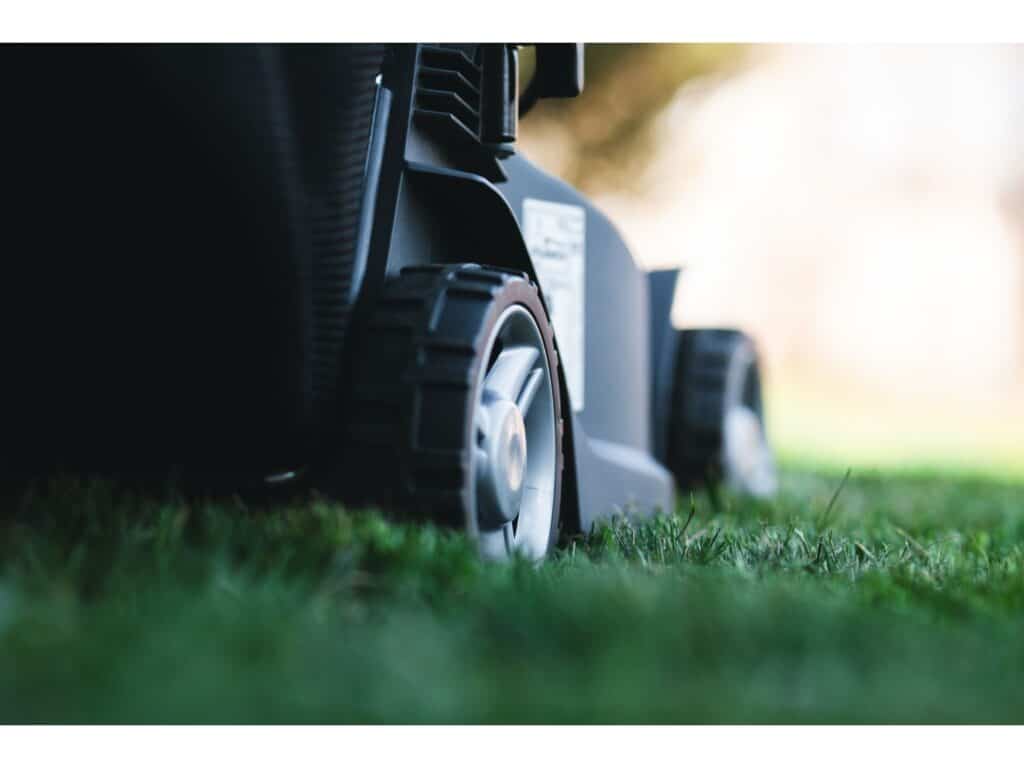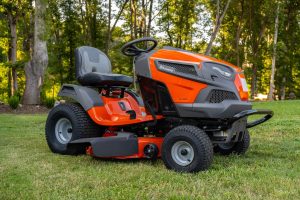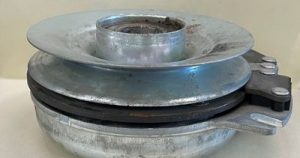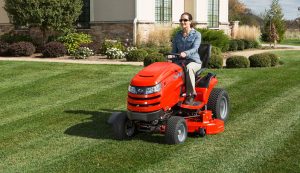Electric Lawn Mowers And Water: What You Need To Know
Electric lawn mowers are a great alternative to gas mowers. They have power and mobility without the cost and environmental impact of traditional gas mowers. However, since electrical mowers are battery-operated, you may be wondering how electric lawn mowers perform when exposed to water.
Electric mowers are not waterproof. An electric mower’s outer shell and battery casing protect the battery and wiring from getting wet, making them water-resistant, but under heavy rain or other wet conditions, water can still get inside. You should still know the safety concerns surrounding electric lawn mowers and rain or water.
In this article, we will cover everything that you would want to know about how water interacts with electric lawn mowers. From potential points of water exposure that may damage your mower to mowing in the rain, we have got you covered!

This post may include affiliate links. Purchases made through these links may provide a commission for us, at no extra cost to you. As an Amazon Associate, we earn from qualifying purchases.
Follow all safety instructions provided in your equipment operator’s manual prior to diagnosing, repairing, or operating.Consult a professional if you don’t have the skills, or knowledge or are not in the condition to perform the repair safely.
Table of Contents
Potential Points of Water Exposure in Your Electric Mower
The outer casing of your electric mower will protect the internal components of your mower from most water damage. As long as you aren’t leaving your mower out in the rain, dumping water on it, or fully submerging it, a little water exposure won’t damage your lawn mower.
However, there are some potential points of exposure that you will want to keep an eye out for.
Battery Housing Compartment is Typically a Hinge
Most electrical lawn mowers include a removable battery so that you can charge the battery without having to make space for the entire mower near an electrical socket.
The housing compartment for the battery is typically a hinge with a latch for easy removal and replacement. However, hinges leave cracks and crevices for water to sneak into the housing compartment and ruin the battery.
The best way to make sure that your battery isn’t exposed to water is to securely close and latch the battery casing anytime you replace the battery.
If the casing is closed properly, the casing plus the outer shell of the mower should be enough to protect your mower from water exposure. Additionally, look to replace the battery casing if the latch or hinge is broken.
Some Electric Lawn Mowers Have Vents
Some electric lawn mowers have strategically placed vents that keep your lawn mower’s battery and motor from overheating. Typically, the vents are placed so that if water gets in through them, it won’t damage any of the internal components of the mower.
However, if you spray water up these vents while cleaning your mower or use your mower in unfavorable weather conditions, then you run the risk of allowing water to get to damaging places via these vents.
Using Electric Lawn Mowers in Different Weather Conditions
Electricity and water are not a winning combination. If you have an electric lawn mower, here are a few considerations to take when using it in adverse weather conditions.
Using an Electric Lawn Mower in the Rain
Mowing in the rain is not a particularly good idea with any type of lawn mower. It is an especially bad idea with an electric lawn mower.
While the outer shell and battery casing will provide some protection, all it takes is one deeper puddle or a sudden downpour to ruin your electric mower altogether.
If you have a corded electric mower, you don’t only risk damaging the mower while using it in the rain, but you also risk your own safety. Since the mower is still connected to the power source, a few rain droplets in the wrong location could cause you to be electrocuted.
Using an Electric Lawn Mower on Wet Grass
Similarly, using an electric mower in wet or damp grass is not the best idea. You still run the risk of hitting a puddle or even having the wet grass clippings damage the inside of your mower.
Additionally, mowing wet grass can put extra strain on the engine, shortening the lifespan of the mower.
Mowing your lawn when the grass is wet is typically just a bad idea in general. Wet grass doesn’t cut as well as dry grass. If your mower’s blade isn’t razor-sharp, you run the risk of your mower actually ripping the grass and its root from the ground rather than trimming the living piece of grass.
When grass is wet, it clumps together, making it difficult for your mower to vacuum up the trimmings. This leaves a lot of trimmings around, which is not necessarily bad for your mower but does ruin the overall look of your lawn.
Electric Mowers in an Area with High Humidity
Those of you living in areas with high humidity already know that corrosion and rust occur much more quickly in these environments.
Exposing your electric mower to the humidity while using it won’t damage it, but storing it outside or in a room that is exposed to the humidity will cause damage.
If you do live in an area with a lot of humidity, make sure to check the battery before each use if it is easily accessible. You can replace a corroded battery, but if you start your machine with a corroded battery, you will likely need to replace the electric mower.
Storing Your Electric Lawn Mower to Avoid Water Damage
It is important to avoid exposing your electric lawn mower to water while using it, but you also have to consider keeping it dry while storing it. Here are a few tips to avoid water damage while storing your electric lawn mower.
Do Not Store Your Electric Lawn Mower Outside
Do not store your electric lawn mower exposed to external elements. Heavy rain will surely damage, or at least limit, the lifespan of your mower.
If you have to leave it outside due to space constraints, keep it under a deck and cover it with a tarp when not in use or a lawn mower cover like this marine-grade cover by Tough Cover.
Do Not Store Your Electric Lawn Mower in a Shed
While a shed is better than just leaving your electric lawn mower outside, it is still not the best place to store your electric lawn mower.
A shed often has leaks and is exposed to water that could damage your lawn mower. In addition, sheds tend to be exposed to humidity. This extended exposure will limit the lifespan of your lawn mower.
Do Leave Your Electric Lawn Mower in a Garage or Basement
You should store your garage in a dry, cool place. Your garage is the ideal location for convenience and protection as long as it is relatively dry.
Before storing your electric lawn mower for the weekend, make sure to clean your lawn mower and possibly move it to your basement if your garage is exposed to the elements at all.
Cleaning Your Electric Lawn Mower Without Causing Water Damage
It is okay to expose your electric lawn mower to water, especially if you are controlling the exposure. More specifically, you are going to need to put water on your mower in order to clean it—and you need to clean it.
Steps to Take Before Cleaning Your Electric Lawn Mower with Water
It is important to clean your electric mower frequently to prevent grass build-up and the clogging of key areas. Take the following steps before cleaning the mower to ensure the water exposure does not damage your electric lawn mower:
- Unplug the electric mower from an external power source.
- If possible, remove the battery from the mower to prevent it from getting wet.
- Remove any attachments, including the bagger and dethatcher.
Once you have completed the above steps, you are ready to begin cleaning your electric mower.
Steps to Take When Cleaning Your Electric Lawn Mower with Water
If you are able to remove the battery from your electric lawn mower when cleaning it, then you do not have to worry too much about where the water goes when you are cleaning your mower.
Of course, you want to avoid oversaturating any wires, but a small amount of water exposure won’t damage anything.
Follow these steps to clean your electric lawn mower safely:
- Do not clean your lawn mower directly after use. Cold or lukewarm water hitting a hot engine or battery will damage the mower.
- Wipe down all the areas that are exposed to grass and trimmings with warm, soapy water
- Avoid getting water on the engine or any internal wiring. A little water exposure is okay, but don’t actively clean these parts.
- Clean the underside of your mower with a brush, paying special attention to large clumps of grass.
- Allow your electric mower to dry completely before putting the battery back in or using it again.
It is really important to keep your mower clean. The blade can become dull or even get clogged if there are too many clumps of grass. Additionally, mold can grow on a dirty mower, which will ultimately spread to your lawn, killing any grass.
Read more about taking care of your electric mower in our article “A Guide to Caring for Your Electric Lawn Mower“.
What to do If Your Lawn Mower Gets Wet
Unfortunately, accidents happen–your basement floods or you forget to bring in your electric mower and it gets left out in the rain. What do you do?
Do not turn on your mower if it is soaked. This will short-circuit the electrical system and damage the motor. Then instead of a wet lawn mower, you will have a broken lawn mower that is beyond repair.
If your electric lawn mower does end up getting water in it, there are a few steps you can take to give your mower the best shot at not sustaining damage.
Dry Your Electric Mower as Quickly as Possible
The first step to salvaging your electric lawn mower after getting it wet is to get it dry as quickly as possible. The shorter time that it is exposed to water, the better.
It varies based on the model of the mower and how long it is exposed to water, but it can take up to eight hours for your mower to dry.
Here are a few things that you can do to help it dry more quickly:
- Remove the water-resistant cover per the manufacturer’s guidelines to increase the airflow.
- Remove the battery if possible and focus your attention on drying that first.
- Leave it out in the sun.
- Use fans to add a lot of airflow.
- Use a hairdryer to quickly draw crevices or small areas.
Once you are sure that the mower is completely dry, you can move to the next step.
Apply Electric Contact Cleaner to Your Electric Mower Connections
For extra precaution, use an electric contact cleaner to make sure the electrical connections and connection terminals are moisture-free. You need to make sure you disconnect the battery prior to doing so. You can also use grease or lubricant if you prefer.
Test and Restore the Insulation Resistance of the Wiring
Once you believe that the lawn mower is completely dry, you can test the insulation resistance of the wiring to confirm that it’s dry. Use a megohmmeter to test for the resistance level. If the value is less than 100,000 ohms, you need to allow the mower to dry further.
Before applying a voltage to the wiring of your mower, you need to make sure that it is completely dry. Even a small amount of voltage can diminish the voltage capability of your mower’s battery.
Once it is completely dry, you can start the process of adding voltage and retesting the resistance. The mower’s user manual should provide guidance on how much voltage to apply.
Once you have reached the required resistance, your electric lawn motor should be ready to operate again. Severe water damage can diminish the lifespan of your electric lawn mower, but you should be able to at least get it functioning again.
Automated Robotic Lawn Mowers Are the Exception
There is an exception to electric lawn mowers not being waterproof. Relatively new to the market are robot lawn mowers. These function very similarly to vacuuming robots, only they are designed to mow your lawn.
These lawn mowing robots run off of electricity and charge off a docking station that is meant to be left outside regardless of the weather. As a result, the lawn mowers themselves are waterproof.
Of course, these lawn mowers are quite pricey, but if you are having trouble keeping your non-waterproof electric lawn mower dry, this may be a great alternative.

Electric lawn mowers are here to stay. They are an environmentally friendly and cost-effective alternative to gas lawn mowers. As long as you keep your electric lawn mower dry, it should be a purchase that lasts you a long time. Make sure to keep your lawn mower in a dry, cool play and happy mowing!
Electric Lawn Mower Safety
Make it a priority to maintain safety while operating an electric lawn mower. Read more about safety in our article “Electric Lawn Mowers Dangers and Safety Guide“.







